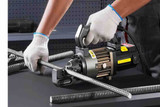Maintenance Tips for Air Compressors in Winter
Key Takeaways
- Regular winter maintenance is crucial for ensuring air compressor reliability and longevity.
- Proper fluid management, including using winter-grade oils, is essential for cold weather operation.
- Moisture control becomes even more critical in winter to prevent freezing and equipment damage.
- Protecting your compressor from direct exposure to cold and implementing proper storage practices can significantly extend its lifespan.
- Adhering to a strict maintenance schedule and performing thorough pre- and post-winter checks can prevent most cold-weather related issues.
Introduction
As winter approaches, maintaining your air compressor becomes more crucial than ever. Cold temperatures can significantly impact the performance and longevity of your equipment if proper care isn't taken. Whether you're a professional contractor relying on your compressor for daily work or a DIY enthusiast tackling weekend projects, understanding how to maintain your air compressor during the winter months is essential. This comprehensive guide will walk you through the key maintenance steps to ensure your air compressor operates efficiently and reliably throughout the cold season
Understanding Winter Challenges for Air Compressors
Before diving into maintenance tips, it's important to understand the challenges that winter poses for air compressors:
- Increased Condensation: Colder air holds less moisture, leading to more condensation in the system.
- Thickened Lubricants: Low temperatures can cause oils to thicken, reducing their effectiveness.
- Frozen Condensate: Water in the system can freeze, causing damage to components.
- Increased Strain on Motors: Cold starts put additional stress on compressor motors.
- Brittle Components: Extreme cold can make certain materials more brittle and prone to cracking.
Essential Winter Maintenance Tips
1. Fluid Management
Proper fluid management is crucial for winter operation:
- Switch to Winter-Grade Oil: Use synthetic oils designed for low-temperature operation.
- Check Oil Levels Frequently: Cold weather can affect oil viscosity and consumption.
- Change Oil More Often: Increased condensation can contaminate oil more quickly in winter.
2. Moisture Control
Controlling moisture becomes even more critical in winter:
- Drain Tanks Daily: Remove accumulated water to prevent freezing.
- Install Automatic Drain Valves: These can help ensure regular draining even in cold conditions.
- Use Air Dryers: Refrigerated or desiccant air dryers can significantly reduce moisture in the system.
- Check and Clean Moisture Separators: Ensure these are functioning properly to remove water from compressed air.
3. Intake Air Management
Managing the quality of intake air is important:
- Relocate Intake If Possible: Draw in warmer air from indoors if the compressor is in a cold area.
- Clean or Replace Air Filters: Cold, dry air can carry more particulates, necessitating more frequent filter maintenance.
- Install Intake Filters: Additional filtration can help protect the compressor from cold air contaminants.
4. Compressor Environment
Protecting the compressor from extreme cold is crucial:
- Insulate Air Lines: Prevent freezing in pipes and hoses.
- Use Heating Tape: Apply to drains and valves to prevent freezing.
- Consider a Compressor Room Heater: Maintain a minimum ambient temperature around the compressor.
- Shelter Outdoor Units: Use weather-resistant covers or build a simple shelter for outdoor compressors.
5. Motor and Belt Care
Pay special attention to the motor and belts:
- Check Belt Tension: Cold can affect belt elasticity; adjust as needed.
- Inspect Motor Bearings: Ensure proper lubrication for cold weather operation.
- Monitor Start-Up Performance: Be alert for any changes in how the motor starts in cold conditions.
6. Pressure Relief and Safety Valves
Ensure all safety systems are functioning correctly:
- Test Pressure Relief Valves: Verify they're not frozen and are operating correctly.
- Inspect Safety Shutoffs: Ensure low-temperature shutoffs are working properly.
7. Winterization Procedures
Implement specific winterization steps:
- Use Antifreeze: In extremely cold conditions, add antifreeze to the intercooler on two-stage compressors.
- Implement Cold Start Procedures: Allow the compressor to warm up before full operation.
- Check Thermostat Settings: Ensure they're calibrated correctly for winter operation.
Pre-Winter Checklist
Before the cold sets in, perform a thorough check:
- Change oil to winter-grade
- Inspect and clean all filters
- Check and adjust belt tension
- Verify all drains are functioning
- Test heating systems if applicable
- Inspect all hoses and connections for leaks
- Calibrate pressure switches and gauges
- Review and update maintenance schedule for winter
Post-Winter Maintenance
As winter ends, prepare your compressor for warmer weather:
- Change oil back to standard grade if necessary
- Clean or replace air filters
- Inspect for any cold weather damage
- Check and adjust belt tension
- Clean and inspect cooling systems
- Verify all safety systems are functioning correctly
Frequently Asked Questions (FAQs)
-
Q: How often should I drain my air compressor tank in winter?
A: In winter, you should drain your air compressor tank daily, or even multiple times a day in extremely cold or humid conditions. Cold temperatures cause more moisture to condense out of the air, leading to increased water accumulation in the tank. This water can freeze, causing damage to the tank and other components. By draining the tank regularly, you prevent water build-up and reduce the risk of freezing and corrosion. Consider installing an automatic drain valve to ensure consistent draining, especially if the compressor is located in an area where manual daily draining might be challenging.
-
Q: Can I use my air compressor outdoors in freezing temperatures?
A: While it's possible to use an air compressor outdoors in freezing temperatures, it's not ideal and requires special precautions:
- Ensure the compressor is rated for the temperature you'll be working in.
- Use winter-grade lubricants and antifreeze where appropriate.
- Allow the compressor to warm up before full operation.
- Protect the compressor from direct exposure to wind, snow, and ice.
- Be prepared for decreased efficiency and potential moisture issues.
- Consider using a portable heater to maintain a workable temperature around the compressor. If possible, it's better to keep the compressor in a heated area and run air lines to your outdoor work area.
-
Q: How do I prevent my air lines from freezing in winter?
A: To prevent air lines from freezing in winter:
- Insulate all air lines, especially those exposed to cold.
- Use a high-quality air dryer to remove moisture from the air before it enters the lines.
- Install water separators at key points in the air distribution system.
- Implement a slope in the piping system to allow water to drain to low points.
- Install drain valves at the lowest points of the system and drain regularly.
- Consider using air line antifreeze in extremely cold conditions.
- Keep air lines off cold surfaces and away from drafts where possible.
- For critical applications, consider heat tracing (heating tape) on air lines.
- Q: What type of oil should I use in my air compressor during winter?
A: For winter operation, it's best to use a synthetic oil specifically designed for air compressors in cold weather. These oils maintain their viscosity at low temperatures, ensuring proper lubrication and reducing wear on compressor components. Look for oils labeled as "all-season" or "winter-grade" with designations such as SAE 5W-30 or 10W-30. Some popular options include:
- Quincy QUIN-CIP-F (SAE 5W-50)
- Royal Purple Synfilm Recip 100 (ISO 32)
- Mobil Rarus SHC 1025 (ISO 32) Always consult your compressor's manual for specific oil recommendations, as using the wrong type can void warranties and potentially damage your equipment.
- Q: How can I tell if cold weather has damaged my air compressor?
A: Signs that cold weather may have damaged your air compressor include:
- Difficulty starting or failure to start
- Unusual noises during operation, especially at startup
- Decreased performance or inability to reach normal pressure
- Visible cracks in hoses, belts, or other components
- Excessive moisture in the air output
- Oil leaks or changes in oil consistency
- Frequent tripping of circuit breakers or blown fuses
- Frost or ice buildup on external components
- Error messages on digital displays (for modern compressors)
- Increased vibration during operation If you notice any of these signs, it's important to stop using the compressor and have it inspected by a qualified technician. Continuing to operate a damaged compressor can lead to more severe issues and potential safety hazards.
Winter Storage Tips
If you need to store your air compressor for an extended period during winter, follow these steps:
- Drain the System: Remove all moisture from tanks, lines, and filters.
- Change the Oil: Replace with clean oil to prevent contaminants from settling during storage.
- Disconnect and Store Batteries: For electric start models, remove and store batteries in a warm, dry place.
- Cover the Compressor: Use a breathable cover to protect from dust and moisture while allowing air circulation.
- Elevate: Place the compressor on a pallet or blocks to prevent direct contact with cold floors.
- Climate Control: If possible, store in a temperature-controlled environment.
- Loosen Belt Tension: Relieve stress on belts during long-term storage.
- Seal Openings: Cover intake and exhaust ports to prevent pests or debris from entering.
Preparing for Spring
As winter ends, take these steps to prepare your compressor for warmer weather:
- Inspect Thoroughly: Check for any signs of winter damage.
- Change Fluids: Replace oil and other fluids if necessary.
- Clean or Replace Filters: Ensure all filters are clean and functional.
- Check Belts and Hoses: Look for cracks or wear and replace if needed.
- Test Safety Systems: Verify all safety valves and shutoffs are working correctly.
- Calibrate Gauges: Ensure all pressure gauges are accurate.
- Lubricate Moving Parts: Apply fresh lubricant to all necessary components.
- Run a Test Cycle: Operate the compressor to check for any issues before full use.
Conclusion
Proper winter maintenance of your air compressor is crucial for ensuring its longevity, efficiency, and reliability during cold months. By following these guidelines, you can protect your investment and maintain productivity throughout the winter season. Remember, prevention is always better than cure when it comes to equipment maintenance.
Don't let winter weather compromise your air compressor's performance. At Tend Industrial Supplies, we offer a wide range of winter-specific maintenance products and services to keep your equipment running smoothly all year round. Visit our website attendsupplies.com to explore our selection of winter-grade oils, antifreeze solutions, and cold weather accessories for air compressors. Our expert team is ready to assist you with personalized maintenance advice and product recommendations. For direct support, contact our sales team at sales@tendsupplies.com. Protect your air compressor investment and ensure uninterrupted operation this winter with Tend Industrial Supplies!









